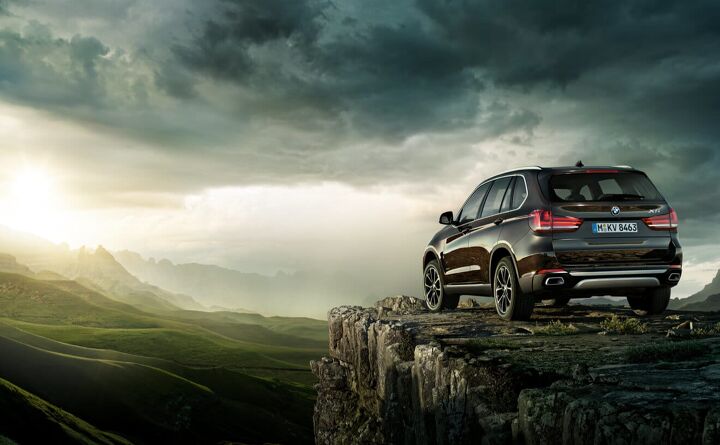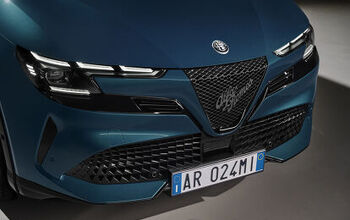When Is an SUV Not an SUV? When You're Just a Little Too Pompous for Your Own Good

Thanks to automakers and their stable of marketing and PR folks, the English language is feeling used and abused these days. Don’t worry, this isn’t a rant about overused industry buzzwords like synergy and dynamism, the popularity of which show no signs of waning. You’ll be hearing those forward-thinking — and intentionally confusing — descriptors for years to come.
Right until cooler, non-lame words like panache and gravitas come into vogue, this author hopes.
Lately, and with increasing frequency, a new language is emerging on the automotive scene. High-minded, plummy, and completely shameless, this new language flings misleading titles at a certain product: utility vehicles, specifically those appealing to buyers known for good breeding, tennis, and summers at the cape.
James Attwood, writing for Autocar, does a good job of exposing the offending automakers for the language charlatans they are. He notes — as we did — that Rolls-Royce, the most well-heeled of automakers, refers to its upcoming Cullinan SUV as a “high-bodied car” — a class of vehicles that exists only in a strange, literal world where serious people call convertibles a “car without a roof,” and pickups a “heavy car without a trunk and a long, metal pan in there instead.”
The column’s author goes on to decry Ferrari’s use of “FUV” in descriptions of its upcoming utility vehicle, and Lamborghini’s obnoxious “super sports utility vehicle” (Urus). Interestingly, Bentley is guilty of no such thing, nor is Maserati.
It’s clear there’s a benign classism at work here, with some high-end automakers apparently unable to subject their customers to a pedestrian moniker like “SUV.” Certainly, “crossover” — a better descriptor, assuming we’re keeping the unibody-only rule alive — could not be applied to such prestigious conveyances. Heavens. No, those two terms conjure up images of Middle America and shopping malls and grocery coupons and public schools. Something the help would drive.
Of course, language being what it is — plus the fact we don’t live in North Korea — means automakers can put whatever label they want on a vehicle. Call it anything but self-driving. Annoyance isn’t a crime, nor should it be.
But as long as we’re on the subject, I’ll take this opportunity to add another automaker to Attwood’s list, and this one isn’t nearly as unaffordable as the others. BMW. Yes, Bimmer has the audacity to tout — as an official designation, and throughout its literature — its utility models’ status as a “sports activity vehicle.” It’s not an SUV, it’s an SAV.
You can tell these models apart from other dissimilar utility vehicles because of the Bimmer’s upright body, engine in the front, unibody construction, and seats located inside the vehicle, rather than in a house down the road. There’s also such brand-defining features as a rear liftgate and available all-wheel drive. Just try and find those trappings from another automaker. Look Bavaria, just because you brought a unibody utility vehicle with car-like driving dynamics to market at a relatively early stage in the game doesn’t mean you should throw capital letters around willy-nilly. Even worse is the brand’s line of “sports activity coupes,” none of which are coupes.
Unfortunately, BMW has company in the ongoing bastardization of the word “coupe.”
Mercedes-Benz, to its credit, proudly flaunts the SUV moniker on its website, while Porsche, maker of two utility vehicles, tries to avoid using it except when absolutely necessary. It has not, however, created its own classification for the Macan and Cayenne. Audi also seems perfectly comfortable to sell premium vehicle buyers an SUV.
What does any of this tell us? Nothing, except that exclusive automakers sometimes want their vehicles described in terms that bring to mind wood-panelled drawing rooms and fox hunts, and that English is one of the odder languages kicking about. Would we have it any other way? Probably not.
[Images: BMW, Rolls Royce]

More by Steph Willems
Latest Car Reviews
Read moreLatest Product Reviews
Read moreRecent Comments
- Lou_BC Well, I'd be impressed if this was in a ZR2. LOL
- Lou_BC This is my shocked face 😲 Hope formatting doesn't fook this up LOL
- Lou_BC Junior? Would that be a Beta Romeo?
- Lou_BC Gotta fix that formatting problem. What a pile of bullsh!t. Are longer posts costing TTAC money? FOOK
- Lou_BC 1.Honda: 6,334,825 vehicles potentially affected2.Ford: 6,152,6143.Kia America: 3,110,4474.Chrysler: 2,732,3985.General Motors: 2,021,0336.Nissan North America: 1,804,4437.Mercedes-Benz USA: 478,1738.Volkswagen Group of America: 453,7639.BMW of North America: 340,24910.Daimler Trucks North America: 261,959



































Comments
Join the conversation
I am hopeful that this marks the beginning of the end of the whole "SUV" trend/craze. Take a compact station wagon and jack it up with big wheels = SUV. There is one benefit once the snow piles get more than 3.5' high that you can see what is coming at an intersection. But then everyone wants to paint them white so they become invisible (in the snow). BAN ALL WHITE CARS NOW! I think I may be having a cabin fever attack...
A simple way to determine a SUV is if it doesn't have four low, then it's a car.